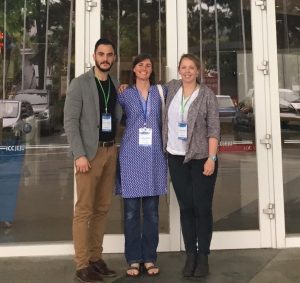
Aberystwyth University KESS 2 PhD candidates Cat Joniver and Angelos Photiades have co-authored their first paper in the International Journal Algal Research (Impact Factor 4.401). Cat and Angelos’ research is focused on nuisance macroalgal (seaweed) blooms and the article ties together both of their research interests by exploring the ecological and socio-economic impacts that macroalgal blooms cause globally and possible solutions of creating products from otherwise unwanted material.
The review article is entitled ‘The global problem of nuisance macroalgal blooms and pathways to its use in the circular economy.’ Together, Cat and Angelos undertook a systematic review, synthesising 639 peer-reviewed papers to:
- identify the spatial and temporal nature of macroalgal blooms;
- quantify the ecological and socio-economic impacts associated with these blooms;
- outline the conversion of macroalgal biomass into products, in particular for the main blooming genera;
- provide an assessment of input and product costs for different compounds;
- and provide feasibility assessments generated from Techno-Economic Analysis (TEA) and Life Cycle Assessments (LCA).
The review paper, co-authored with their academic supervisors Dr Jessica Adams, Prof Pippa Moore and Dr Ana Winters and company director Dr Andrew Woolmer; highlighted green macroalgae as the predominant blooming taxa with biorefinery as the main use of algae within this taxa. However, from feasibility assessments biofuels were found to be the most potentially economical use of nuisance macroalgae.

(Left to Right) Angelos Photiades, Jessica Adams (lead supervisor for both) and Cat Joniver in South Korea at International Seaweed Symposium 2019
Cat says,
“We are so excited for this article to be published; both mine and Angelos’ PhD research topics fit so well together to create this story of nuisance impactful macroalgae to produce. It is becoming more evident that global resources are diminishing and that we should be incorporating materials and products for (re)use in the circular economy wherever viably possible.
Both myself and Angelos are grateful for both the support of KESS 2 and GreenSeas Resources, our company partner, so that we could reach this point. KESS 2 has boosted our skills, confidence and knowledge and most importantly given us the time to develop ourselves professionally as scientists”.
Angelos says,
“We tried to reflect on the general nuisance of blooming macroalgae and place this into the contemporary context of circular economy and sustainability. I believe we succeeded. The timing is right; seaweed is becoming increasingly popular as cultivation of macroalgae could potentially mitigate climate change. However, there are tons of blooming material which can provide high added-value products and should be incorporated into future biorefineries. ‘How could we use this material’, ‘what are the advantages and disadvantages’ and ‘what is being considered feasible by the scientific community’ are some of the questions this article answers. Writing this article definitely made us more familiar with our fields and it was insightful but also challenging. We are grateful for the support of KESS 2, our supervisors and GreenSeas Resources.”
Jessica Adams, lead supervisor, adds,
“This is an excellent first paper for both Cat and Angelos to complete for their PhDs. In addition to improving their academic writing skills it has been published in a high-impact journal which has consistently been rated in the top quartile for agronomy and crop sciences journals and should be a valuable, highly cited article in the future.”
Andy Woolmer, of the sponsor company GreenSeas Resources, states that,
“I’m really pleased that Cat and Angelos have been able to write this paper in collaboration with GreenSeas resources during their KESS 2 PhDs. I have no doubt that this article will be useful for other companies, as it has been for us.”
The full published paper can be found here: https://doi.org/10.1016/j.algal.2021.102407








